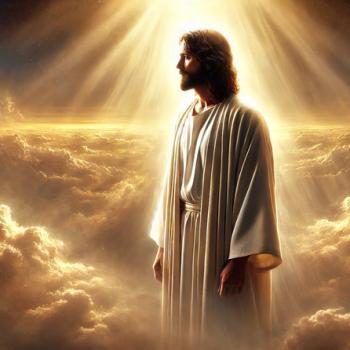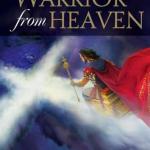Tribulation Force, pp. 396-397
As the former rabbi Tsion Ben-Judan shouts his redundant conclusion — “Jesus Christ is the Messiah!” — he has Buck Williams shouting along with him:
Buck leaped from the couch in the green room, standing now, watching the monitor. Others had gathered, but he couldn’t help himself. He shouted, “Yes! Go, Tsion! Amen!”
Woo-hoo! In your face, Judaism!
Buck here illustrates another important point in our lesson on How Not to Do Evangelism. Fist-pumping triumphalism is never a winsome or attractive trait. Buck’s end-zone victory dance is going to get his team penalized for unsportsmanlike conduct and excessive celebration. Those others gathered around the backstage monitor won’t be able to hear or appreciate anything Tsion is saying because they’ll be too put off by Buck’s loud rendition of “Christianity, frak yeah!”
Most preachers and missionaries understand the distinction that political campaigners make when they speak of the difference between “outreach” and “firing up the base.” Effective politicians know that the sorts of things one says to rally the faithful are not the same sorts of things one says to try to persuade the unconvinced. That’s why big political fundraising events tend to be closed to the media — because the message that’s appropriate for that audience might be off-putting or confusing to swing-voters and independents or to others not yet convinced of the in-group’s premises.
Buck and Tsion, like LaHaye and Jenkins, don’t seem to appreciate that distinction. Even worse, the authors don’t seem to appreciate that the analogy I’ve just drawn compares two different things — that missionary outreach is not the same as political campaigning, that it’s not about a battle for power.
Tsion’s whole broadcast has been a kind of extended political attack ad trying to tip the balance in some contest between Christianity and Judaism. He might as well have used unflattering grainy black-and-white footage of Orthodox Jews moving in slow motion while getting the movie-trailer guy to do a menacing, sarcastic voiceover, “Judaism claims to be awaiting the Messiah, but it’s voting record tells a different story. …”
Sadly, Tim LaHaye and Jerry Jenkins aren’t alone in imagining that negative advertising is the key to effective evangelism. There’s a vast and thriving cottage industry of this sort of thing in the evangelical subculture, one that has existed for decades on the traveling-speaker and seminar circuit and in recent years has proliferated online. Look around and you’ll find scores of purportedly “evangelistic ministries” that spend nearly all of their time on negative campaigning, as though the only way to promote the Christian gospel was to tear down everything else. These “ministries” stake out their little niches based on whatever it is they’re attacking — “secular humanism,” Paganism, Mormonism, Methodism, science or whatever else it is they’ve decided to attack as a “cult.”
Those ministries tend to engage in a great deal of bearing false witness, but even if their attacks were not so thoroughly distorting and dishonest — even if these liars for Jesus weren’t lying — it would be impossible to accept their claims that what they’re doing has anything to do with evangelism. Such negative attack ads may be useful for drawing thick lines between Us and Them. But they have never, ever been of any use for persuading Them to join Us.
Ben-Judah’s show ends with him trying to blurt out as much as he can before he gets cut off:
Suddenly the TV studio was crawling with activity. Orthodox rabbis called, angry Israelis pounded on the doors, studio technicians looked for the cue to pull the plug.
This series features as many furiously Christ-hating “Orthodox rabbis” and “angry Israelis” as it does conspiracies of international bankers. All of that sure sounds quite similar to what would, elsewhere, likely be perceived as anti-Semitism. But Tim LaHaye very much wants you to know that he doesn’t hate Jews. He loves Jews. Like Tsion Ben-Judah — his Jewish surrogate in this chapter — LaHaye loves Jews so very much that he urges them to stop being Jewish so that they might be spared the eternal damnation to Hell that all Christ-killing, Messiah-denying Jews deserve.
In any case, why are the studio technicians still waiting to pull the plug on Tsion? You’d think that cue should have been given five minutes into this broadcast, when Ben-Judah made it clear that all of his research was based on the work of a Christian convert and that Christian ideas like a virgin birth in Bethlehem were all he cared about.
“There can be no other option,” Ben-Judah says:
“I had come to this answer but was afraid to act on it, and I was almost too late. Jesus came to rapture his church, to take them with him to heaven as he said he would. …”
You remember the Rapture — that little thing where 2 billion people, including every child on earth, instantaneously disintegrated without explanation. It’s been more than 800 pages since the Event, but for the characters in our story, only about six weeks have passed.
In working through Tribulation Force, I’ve been less emphatic about this than I was with the first book, but it’s still just as true throughout these pages that nothing portrayed here — absolutely nothing — could occur in the way that the authors describe. This story is set in a suddenly childless world populated by suddenly childless people. This should be a world more full of weeping than we can understand.
And yet this is scarcely ever remembered, let alone allowed to shape and reshape the characters or events in these books. No one behaves anything like the way real humans would behave in the wake of such a horrifying mystery. Individuals are uniformly portrayed as unaffected by the loss of their children, and the organizations that rely on those individuals to operate — the governments, businesses, media, airports, restaurants, police, etc. — continue along exactly as they were before, exactly as though there were no significant differences between a world with children and a world without children, between the ordinary day-to-day of readers’ lives and the world of this story with its universal, fathomless loss.
I don’t point this out on every occasion that it arises because it arises on every page, in every sentence of this book. But since Tsion Ben-Judah and the authors just brought this to our attention again, let’s consider what the Event would have meant for the rabbi’s research project and the plans for this broadcast. Parents who watched their young children dissolve into thin air less than two months ago would not care about this project. It’s not just that it wouldn’t capture their interest, it’s that their interest would be firmly and urgently captive to one and only one thing. Such a broadcast would be irrelevant and such irrelevance would be a painful insult. The planned broadcast in which Rabbi Ben-Judah recites the findings of his three-year research project on the prophecies of Messiah would be replaced with a broadcast of a different rabbi presenting the findings of his four-week research project of his own prophecies about the Messiah who will bring back his missing daughter and all the other children.
Had Tsion spoken to anyone other than Buck during the past six weeks he would have realized that this mention of the Event wasn’t something to toss out as almost an afterthought in his broadcast. It should have been the central focus of everything he said. This man believes that he knows what happened to his audience’s missing children, and yet he doesn’t see fit to even mention this, except indirectly at the very end of his hourlong talk. That seems cruel.
But the traumatized, grieving families I imagine as Ben-Judah’s audience are not the audience the authors are imagining or the audience he is speaking to here. That audience, instead, appears to be made up of people from all over the world who share Tim LaHaye’s peculiar Darbyist hermeneutic despite never having previously opened a Bible or even hearing enough about it to be familiar with even the broadest outlines of the Christmas story.*
The authors imagine an audience that is hanging on Tsion’s every word, undisturbed and undistracted by any recent losses.
“Gee, honey, that fellow on the TV says that there was a prophecy hundreds of years before Jesus’ birth that said the Jewish Messiah would ride a donkey, and then all those hundreds of years later Jesus rode a donkey.”
“Yes, dear, so I suppose we should stop being Muslims/Mormons/Animists and worship Jesus for having stolen our children.”
Such people do not exist and have never existed. Such people would scarcely even be “people” in any conventional sense of the word.
Ben-Judah shouts a phone number “to call to obtain more information” and then, as they finally move to end his broadcast:
“Yeshua ben Yosef, Jesus son of Joseph, is Yeshua Hamashiac!” the rabbi shouted quickly. “Jesus is the Messiah!” And the screen went blank.
So much for that whole “seed of woman” thing from earlier, I guess.
Rabbi Ben-Judah gathered up his notebook and looked frantically for Buck.
“I’m here, brother!” Buck said, running into the studio. “Where’s the car?”
They flee in Ben-Judah’s limo. Fortunately, no one is chasing them, since a car chase in Jerusalem would be tricky in anything larger than a Vespa.
“Now that was anticlimactic,” Nicolae Carpathia concluded.
He’s not wrong.
“This is old news. Lots of people believe this …”
Still not wrong.
“I would have liked him saying he was the Messiah better.”
You know you’re in trouble when even the main villain in your story is complaining about the plot and wishing he were a character in a more interesting book.
– – – – – – – – – – – –
* Let me just reiterate that LaHaye’s and Ben-Judah’s preoccupation with the Christmas story as the main basis for the claim that Jesus is the Christ is out of step with the main message of the New Testament and what we Christians believe. The Christmas story was shaped to support our belief that Jesus is the Christ, but it was never meant to be the basis of that belief. We believe that Jesus is the Christ because of Easter, not because of Christmas.
















